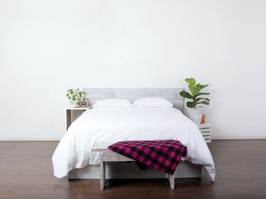if you’ve mashed “insomnia” into a search bar in the early hours of the morning, you are in good (bleary-eyed, fatigued) company. according to
a new study from the american academy of sleep science, online searches for “insomnia” soared in spring 2020. there were 2.77 million google searches for insomnia in the u.s. from january to may. and while searches were trending downward in january and february, the spring surge translated to a 58 per cent increase in searches compared to the same time period over the previous three years.the study,
published in the journal of clinicial sleep medicine, found that the searches typically happened during the prime shut-eye hours of midnight and 5 a.m., peaking around 3 a.m.
insomnia is characterized by trouble falling asleep, staying asleep through the night, or waking up too early in the morning. the study’s lead author, neuroscientist kirsi-marja zitting, says that the findings show “a lot of people were having trouble sleeping during the first months of the pandemic,” with some showing symptoms of insomnia.“while acute insomnia, typically triggered by stress or a traumatic event, will often go away on its own, i am worried that the longer this pandemic drags on, the greater the number of people who go on to develop chronic insomnia,” she says. “and unlike acute insomnia, chronic insomnia can be difficult to treat.”in canada, it’s
estimated about 25 per cent of adults are dissatisfied with their sleep with six to 10 per cent meeting the criteria for an insomnia disorder. not only does it feel terrible, insomnia
can also increase your risk and severity of high blood pressure and heart disease, the mayo clinic says, and even slow your reaction time, which makes it a dangerous issue for drivers. then there’s your mental health, with poor sleep related to depression and anxiety disorders.if you’re among the many insomnia googlers, there are proven ways to combat poor sleep. experts recommend paying attention to something called
sleep hygiene — which are “behaviours that one can do to help promote good sleep using behavioural interventions,” according to the american sleep association.here are some basic tips for improving your sleep hygiene:
ditch the devices
many of us reach for our smartphones first thing in the morning and spend the moments before turning in watching tv or scrolling through social media feeds. that’s no good. experts recommend avoiding gadgets before bed. the sleep foundation, a u.s.-based non-profit,
suggests creating a “30-60 minute pre-bed buffer time that is device-free. cell phones, tablets, and laptops
cause mental stimulation that is hard to shut off and also generate blue light that may decrease melatonin production.”
bed = sleep
in their
sleep hygiene guide, anxiety canada recommends that you only use your bed for sleep (“sex is the only exception”). things like watching tv, or studying, can keep your brain alert and may hamper your attempts to doze off.
stick to a schedule
while sleeping in on a saturday morning can feel heavenly, it may be doing you more harm than good. for people struggling with sleep, it’s important to stick to a schedule, even on days when you might have the option of sleeping in.
experts at harvard medical school say sticking to the same sleep times — even on the weekend — can help prevent a “monday morning sleep hangover.” it’s largely because sticking to a sleep schedule helps us set our body’s internal clock, which in turn sets us up to “expect sleep at a certain time night after night.”
turn down the thermostat, dim the lights
the dark and cold of winter is great for hibernating; get cozy, dim the lights and avoid replicating t-shirt weather in your bedroom when you’re getting ready for bed. experts suggest trying to limit exposure to bright light and keeping your bedroom cool, but not cold. because your body temperature drops when you sleep, it makes sense that a cooler temperature might signal to you it’s time for bed. the sleep foundation
points to research that suggests keeping the theromostat between 15.6 to 19.4 degrees celsius is best for comfortable sleeping.
nap with caution
there’s been a lot of talk about napping
helping boost productivity. but some experts warn that if you’re already having issues getting to sleep at night, you might want to avoid daytime slumber.the american sleep association
says, “when we take naps, it decreases the amount of sleep that we need the next night – which may cause sleep fragmentation and difficulty initiating sleep, and may lead to insomnia and sleep deprivation.”
healthy daytime, healthy nightime
a lot of what we do during our waking hours to stay healthy can help us get better sleep as well. exercise can give our sleep a boost, as can getting a bit of sunshine each day. you also want to avoid caffeine in the late afternoon and evening, as well as cigarettes and heavy meals before bed.
start small
anxiety canada
suggests making small adjustments first. “don’t try to do everything all at once. instead, pick one or two strategies and try them consistently.” maybe that means you won’t give up your bedtime viewing of
the crown, but it does mean you’ll avoid watching from bed while you stick to the same sleep hours each night.“the goal is to slowly start increasing behaviours that can help you sleep, while reducing the things that are interfering with your sleep,” the guide says. it may even help to keep a sleep diary to track how the changes are impacting your zzz’s.
monika warzecha is the homepage editor of healthing.cadon’t miss the latest on covid-19, reopening and life. subscribe to healthing’s daily newsletter covid life.

 4 minute read
4 minute read





